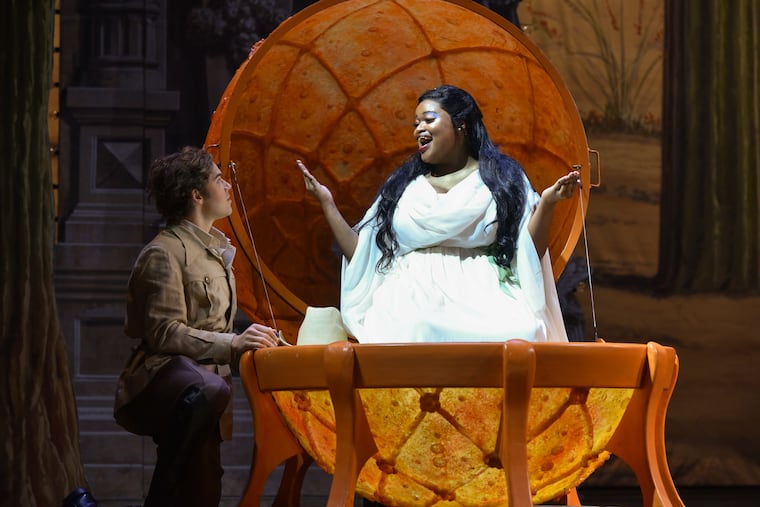A Prokofiev’s ‘Love for Three Oranges’ that’s easy to love and easy on the eyes
It's the first time Prokofiev's fairy-tale farce has been performed by Opera Philadelphia.

When one of your operas is about a couple of teens who livestream their violent standoff with police and another a meditation on opera and death, you need a little magical escapism. Friday night at the Academy of Music, audiences got it: Prokofiev’s The Love for Three Oranges.
Opera Philadelphia’s O19 festival is in full swing with nine events this weekend alone, and, as fairly standard repertoire, the Prokofiev is among the more traditional of the offerings. But it is also a novelty, at least for Opera Philadelphia, which has never before staged it in the company’s 45 years.
The story is both fairy tale and farce. It concerns a prince who can’t laugh, having gorged on too much poetry. When he finally does laugh, it’s at the expense of a witch, who puts a curse on him. He steals three oranges from a giant cook with a ladle for a weapon. Inside each orange is a princess, one of whom falls for the prince. But the angry witch turns the princess into a rat, and from there, as happens in many a good fairy tale, it’s pretty much a straight shot to happily ever after.
If it sounds like something out of Maurice Sendak, well, the story actually has its roots in 17th-century Italy, but Sendak did design a 1982 production for the Glyndebourne Festival. This Opera Philadelphia performance uses a production by the Maggio Musicale Fiorentino and an English translation, and while it doesn’t have Sendak’s strong through-line aesthetic, it is appropriately fun and fanciful.
Director Alessandro Talevi marries the existing commedia dell’arte with references to the New World and American West. The three oranges look like they’re borrowed from a SpongeBob episode. And you haven’t lived, operatically speaking, until you’ve seen a vegetable grater and an old-school stove-top espresso maker engaging in swordplay.
The music, it must be said, is uneven — through no fault of the Opera Philadelphia orchestra, chorus, the large cast of characters, or conductor Corrado Rovaris, all of whom were excellent. It has few, if any, real arias. Melodies are brief. And though harmonies and highly original orchestral effects can be gorgeous, no sooner do they announce themselves than they disappear. Prokofiev succeeds in creating a musical language for this opera all its own, and the famous march that has escaped into the pop-culture realm is not representative of the rest of the score. You might never suspect this to be the same creator as Romeo and Juliet or the symphonies.
But Prokofiev’s methods do serve voice well. As the Prince, tenor Jonathan Johnson was lithe in sound and clear in diction, partly because of the writing but also by way of his own considerable strengths. The witch Fata Morgana arrived in nuanced layers of evil as sung by Wendy Bryn Harmer, a soprano with the rich heft of a mezzo (and a little bit of a Norma Desmond thing going on).
If only more of the music were as beautiful as the section near the end when the King of Clubs, sung commandingly by Scott Conner, is trying to decide the fate of the evil-plotters. That’s a musical paradise into which we’d be all too happy to disappear.
Additional performances: Sept. 22 at 2 p.m., Sept. 27 at 8 p.m., and Sept. 29 at 2 p.m., the Academy of Music, Broad and Locust Streets. Tickets: $25 to $299. www.operaphila.org, 215-732-8400.